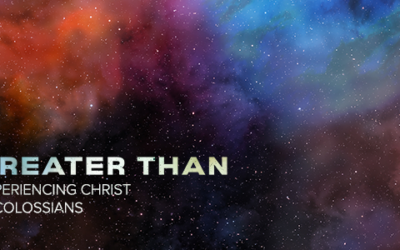Day 4: Joining a new family
Barry Applewhite, author
In these times, citizenship is a big deal. We all want to belong, and having citizenship comforts us by giving us an identity. Becoming part of an extended family does the same thing on a more intimate level. Imagine how much more intense the belonging would be when you become a citizen of God’s kingdom and a member of his own household. As those who have committed themselves to Christ, we have been given both forms of belonging. Adjusting our thinking about this belonging takes a bit longer.
Read
Ephesians 2:19-22
19 Consequently, you are no longer foreigners and strangers, but fellow citizens with God’s people and also members of his household, 20 built on the foundation of the apostles and prophets, with Christ Jesus himself as the chief cornerstone. 21 In him the whole building is joined together and rises to become a holy temple in the Lord. 22 And in him you too are being built together to become a dwelling in which God lives by his Spirit.
What part of the building are the apostles and prophets?
Reflect
In essence, God offered amnesty through Christ, and we accepted it when we gave him our allegiance. But taking that action based on our faith in Christ had far-reaching effects. We may have simply thought that we were joining a church, but trusting in Jesus put us into a new kingdom (verse 19 and Colossians 1:13) where we enjoy the same citizenship as God’s people.
Are you holy? (Are you committed?)
By calling us “God’s people” (verse 19), the NIV departs from tradition. The Greek phrase is oi hagioi, and it traditionally means “the holy ones” but is usually translated into English as “the saints” (NIV, ESV). The NIV rightly realizes that few Christians are comfortable with being called “holy,” and the word “saints” is generally reserved for those few officially named to be saints by the Roman Catholic Church.
Over time, biblical scholarship has made advancements in understanding both Hebrew (Old Testament) and Greek (New Testament). The original understanding of the Hebrew word qdsh, usually translated “holy,”was published in 1878 and was based on etymology. Etymology attempts to determine word meaning by analyzing how the word originated, and such knowledge is often uncertain, as it was here. In the twentieth century, etymology was largely abandoned in biblical research, following the lead of linguistic research.
So, a better analysis of Hebrew qdsh and Greek hagios had to wait until 1986 when Claude B. Costecalde
published his exhaustive research (in French)[1] and determined that these words meant “consecrated” or “devoted” and were used to express “commitment” in a relationship.[2]
So, when I earlier said that oi hagios traditionally means “the holy ones,” I spoke according to the old (mistaken) meaning. I could have used the more deeply researched meaning: “the committed ones.” What I believe is that you don’t know what “the holy ones” means. Neither do I. But we both know what “the committed ones” means, because that is what we know and expect in marriage, family, and close friendships.
So, how do you assess your commitment to Christ? Would others say that you are committed to him? Explain.
A new home for God
Verse 19 ends with the astonishing statement that we are members of God’s household. Starting with the word for household, Paul begins a rhetorical and metaphorical riff using many Greek words that form from the word for house. This kind of wordplay is probably meant to build the expectation of the recipients about how he will end it. They will be surprised!
Suddenly, verse 20 takes us to the metaphor of a building: the indispensable teachings of the apostles and the reliable predictions of the New Testament prophets provide the necessary preparation for the foundation stone, which is “Christ Jesus himself” (verse 20). Yes, I know that the NIV calls Jesus the “chief cornerstone” by translating a Greek noun that is also used in Isaiah 28:16 in the Greek translation of the Old Testament. In Isaiah 28:16, the Greek noun translates the Hebrew noun pinnah, which is a foundation stone. It turns out that pinnah is borrowed from a nearby people who used it to mean vertebrae, a backbone.[3] Jesus is the backbone of the building. Such stones were the primary load-bearing stones and determined the lines of the building.[4]
We go from a building to a temple in verse 21 as the metaphor begins to take on its full detail. Note carefully that both verses 21 and 22 start with the phrase “in him [Christ]” to show that union with Christ is still central to the metaphor. It is only in Christ that we have access to God. The verbal forms in the two verses add to the metaphor and to the concept of union: in verse 21, sunarmologeo (“joined together”) comes from the architectural practice of squaring off stones before joining them[5]; in verse 22, sunoikodomeo (“being built together”).
While verse 21 makes the refinement of saying the building is a temple, verse 22 names the recipients of the letter as being among the temple’s stones, along with all others in Christ, both Jew and Gentile. They are in Christ by the Spirit to become the dwelling place of God — a Trinitarian closing for chapter 2.
[1] Peter J. Gentry, “The Meaning of ‘Holy’ in the Old Testament,” Bibliotheca Sacra, 170 (October-December 2013) 417.
[2] Claude Bernard Costecalde, Aux origines du sacré biblique (Paris: Letouzey & Ané, 1986).
[3] HALOT, pinnah, cornerstone; drawn from Ugaritic with meaning “vertebrae,” q.v.
[4] Peter J. Gentry, “The Meaning of ‘Holy’ in the Old Testament,” Bibliotheca Sacra, 170 (October-December 2013) 417.
[5] William Larkin, Ephesians: A Handbook on the Greek Text, (Waco: Baylor, 2009) 46.


